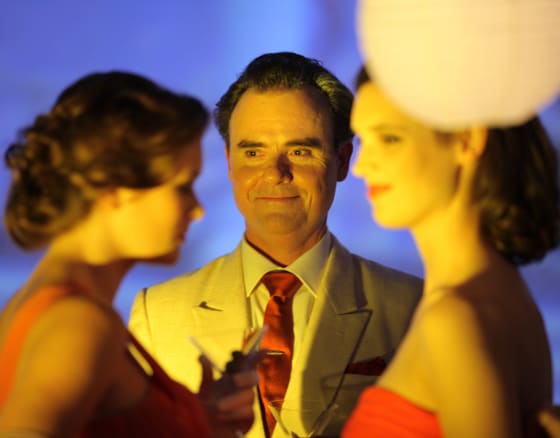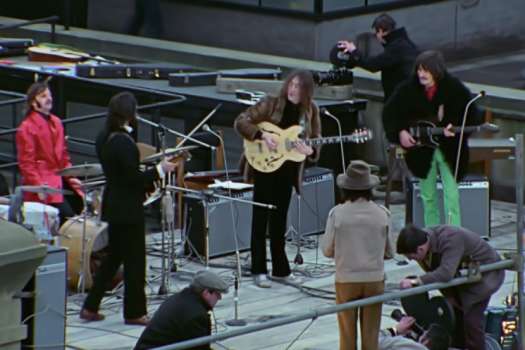Australian director Gillian Armstrong is intrigued by history and how it's portrayed. Many of her films are period piece biopics, while others are cinematic adaptations of classic literature. She's seemingly interested in how the past affects the present and what meaning there is to find in the changes that happen over time. This is evident in her ongoing documentary experiment with three South Australian teenage girls — now adult women — wherein she releases a film every few years (Smokes and Lollies, Fourteen's Good, Eighteen's Better, Bingo, Bridesmaids & Braces, and so on), updating us on what has happened in their lives and where their priorities and concerns are in the present.
Women He's Undressed is one of the few documentaries Armstrong has shot that aren't about these girls, but it is no less concerned with linking the past with the present.
The subject here is Orry-Kelly, the Australian-born costume designer that moved to New York in the 1920s and went on to work on over 300 movies, winning three Academy Awards (after the Awards were created in 1948). Utilizing archival footage, an abundance of interview snippets with Kelly's friends and colleagues, and actor projections of presumed psychological and emotional states (Darren Gilshenan plays Kelly with an abundance of energy and an underlying melancholy), she outlines the evolution of his career and provides a generalized backdrop of the political and social climate of the film industry throughout. It's exceptionally well paced and edited, presenting an abundance of fascinating anecdotes and tidbits in a somewhat gossipy, yet aesthetically lush manner, never slowing down until the credits roll.
The title — Women He's Undressed — sets the tongue-in-cheek tone quite effectively; Orry-Kelly was gay, and he was one of the few men in Hollywood to be relatively open about it at the time. Though insiders knew he was Cary Grant's "roommate" for some time, the studio system had a slightly more conservative perspective on how their talent should be presented, sending leading ladies out to publicity events with the actor to give the illusion of heterosexuality.
Oddly, this sidebar bit of gossip about Grant's hidden romantic relationships and mentions of his failed marriages to women is the one thing that doesn't really fit with this otherwise concise doc. How the issue was treated in relation to the restrictions eventually imposed on cinema, ensuring women didn't show leg above the knee or go unpunished for unladylike behaviour, does help reiterate Kelly's irreverence, but it also gives the impression that the doc is more about homophobia in the Hollywood system than the costume designer himself. Once this is out of the way, though, the focus shifts back to discussions covering Kelly's designs over the years, outlining his professional relationships with actresses like Bette Davis, Jane Fonda and Rosalind Russell.
The mixture of friends, actors and industry professionals intertwining stories with analysis and historical facts ensures that this montage of movie scenes never gets dull. It's an uplifting and inspirational doc about a dynamic figure playing by his own rules in an industry run by influence and reputation, never holding back on mixing the dark with the light. Armstrong doesn't hide the fact that Kelly suffered from alcoholism, just as she doesn't care to mask some of the popular ingénues of the time were temperamental assholes.
The only real flaw here is the weirdly vengeful tone that eventually comes through. Though people can only speculate about what Grant and Kelly discussed within the walls of their respective homes, there's a strange vilification of Cary Grant that contradicts some interviews that posit him as a victim of the celebrity cycle of repression. Perhaps this is just a misinterpretation, as this all stems from inference and placement of statements, but the pointed implications do seem to guide the audience towards a specific opinion. Of course, considering the vague treatment the studios get — their behaviour is mentioned, but specific people and specific studio names aren't necessarily mentioned — there's likely more to the story than is shown onscreen. Regardless, Women He's Undressed is full of vitality, creativity and information that lovers of classic cinema are sure to enjoy.
(Damien Parer Productions)Women He's Undressed is one of the few documentaries Armstrong has shot that aren't about these girls, but it is no less concerned with linking the past with the present.
The subject here is Orry-Kelly, the Australian-born costume designer that moved to New York in the 1920s and went on to work on over 300 movies, winning three Academy Awards (after the Awards were created in 1948). Utilizing archival footage, an abundance of interview snippets with Kelly's friends and colleagues, and actor projections of presumed psychological and emotional states (Darren Gilshenan plays Kelly with an abundance of energy and an underlying melancholy), she outlines the evolution of his career and provides a generalized backdrop of the political and social climate of the film industry throughout. It's exceptionally well paced and edited, presenting an abundance of fascinating anecdotes and tidbits in a somewhat gossipy, yet aesthetically lush manner, never slowing down until the credits roll.
The title — Women He's Undressed — sets the tongue-in-cheek tone quite effectively; Orry-Kelly was gay, and he was one of the few men in Hollywood to be relatively open about it at the time. Though insiders knew he was Cary Grant's "roommate" for some time, the studio system had a slightly more conservative perspective on how their talent should be presented, sending leading ladies out to publicity events with the actor to give the illusion of heterosexuality.
Oddly, this sidebar bit of gossip about Grant's hidden romantic relationships and mentions of his failed marriages to women is the one thing that doesn't really fit with this otherwise concise doc. How the issue was treated in relation to the restrictions eventually imposed on cinema, ensuring women didn't show leg above the knee or go unpunished for unladylike behaviour, does help reiterate Kelly's irreverence, but it also gives the impression that the doc is more about homophobia in the Hollywood system than the costume designer himself. Once this is out of the way, though, the focus shifts back to discussions covering Kelly's designs over the years, outlining his professional relationships with actresses like Bette Davis, Jane Fonda and Rosalind Russell.
The mixture of friends, actors and industry professionals intertwining stories with analysis and historical facts ensures that this montage of movie scenes never gets dull. It's an uplifting and inspirational doc about a dynamic figure playing by his own rules in an industry run by influence and reputation, never holding back on mixing the dark with the light. Armstrong doesn't hide the fact that Kelly suffered from alcoholism, just as she doesn't care to mask some of the popular ingénues of the time were temperamental assholes.
The only real flaw here is the weirdly vengeful tone that eventually comes through. Though people can only speculate about what Grant and Kelly discussed within the walls of their respective homes, there's a strange vilification of Cary Grant that contradicts some interviews that posit him as a victim of the celebrity cycle of repression. Perhaps this is just a misinterpretation, as this all stems from inference and placement of statements, but the pointed implications do seem to guide the audience towards a specific opinion. Of course, considering the vague treatment the studios get — their behaviour is mentioned, but specific people and specific studio names aren't necessarily mentioned — there's likely more to the story than is shown onscreen. Regardless, Women He's Undressed is full of vitality, creativity and information that lovers of classic cinema are sure to enjoy.




